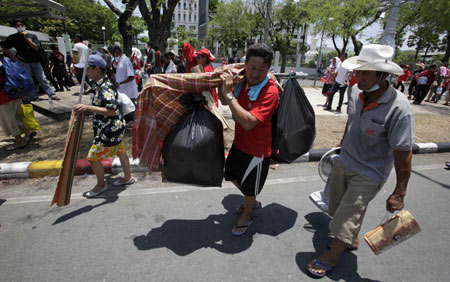Not till early afternoon, the Thai security authorities have managed to disperse red-shirted protesters in many areas in Bangkok as traffic have resumed. And Abhisit concluded at the end of Monday that his mission to bring back peace and order to the country has nearly completed.
 |
|
Supporters of ousted Thai prime minister Thaksin Shinawatra leave with their belongings at the Government House area in Bangkok April 14, 2009. [Xinhua]
|
The premier also confirmed that there was two dead cases from clashes at the Nang Lerng Market on Monday evening, where the government accused the red-shirt protesters of intruding and clashing with local residents.
Bangkok during last two days has seen 121 people injured and two dead in the chaos, which will deal another blow to tourism, one of Thailand's biggest foreign exchange earners. Several countries and regions, including Australia, China and Russia have issued travel warnings to their citizens.
The state of emergency was imposed on Sunday after thousands of red-shirts on Saturday (April 10) forced through army's cordons and stormed the ASEAN summit venue and media center, as a way to force Abhisit to resign. Abhisit had to announce the cancellation of the then-ongoing ASEAN summit and related summits due to security concern, adding that the protesters who broke the law must get punished.
The UDD, loyal to the ousted former prime minister Thaksin Shinawatra, arranged a mass anti-government rally on April 8-10, attracting as many as 100,000 supporters to join them.
The political unrest in Thailand has been ongoing since former prime minister Thaksin Shinawatra was removed by a military coup in 2006.
In November last year, swarms of anti-government demonstrators, or called as "yellow-shirted" protesters, marched to the streets and shut down the country's main international airport for one week.
After a court ordered the removal of the previous pro-Thaksin government, Abhisit was appointed by the Parliament in December, prompting displeased Thaksin supporters to stage regular street protests.
(Xinhua News Agency April 15, 2009)